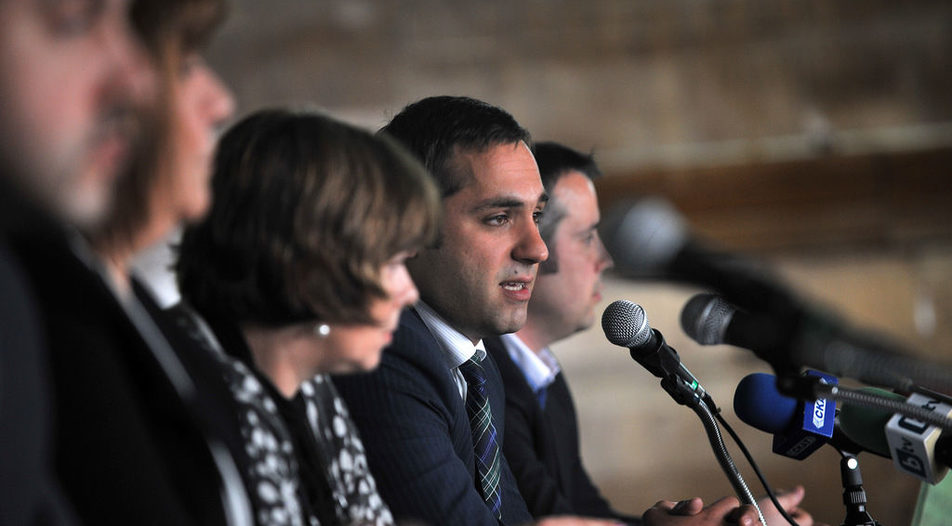When Emil Karanikolov was named Minister of Economy in the coalition government led by PM Boyko Borissov last month, the larger public barely knew anything about the bureaucrat, who had been in charge of the government's Privatization and Post-Privatization Control Agency (PPCA) since 2010. The only publicly known fact about Mr. Karanikolov, however, was that he had never had anything to do with Ataka, one of the three parties in the United Patriots alliance, which nominated him.
Mr. Karanikolov's rise to the post of government minister is a showcase example of the intermingling of the economic interests of Bulgarian political parties irrespective of their political rhetoric - from the on-the-surface ultranationalist, anti-Turkish Ataka (the Bulgarian for "attack"), through centrist, pro-EU GERB, to the Turkish ethnic-business conglomerate DPS.
Stellar career, rare achievements
Under the reign of Mr. Karanikolov, the privatization authority completed several controversial deals, including one that saw Bulgaria's largest cigarette producer, Bulgartabac Holding, sold off in 2011 under non-market conditions to companies linked to the family of Delyan Peevski, a media mogul and an MP from the Movement for Rights and Freedoms (DPS), Tsvetan Vassilev, ex-owner of Corporate Commercial Bank that collapsed in 2014, and the owners of alcohol group Vinprom Peshtera.
Mr. Karanikolov rose from a junior administration official in Sofia Municipality to a senior director in the Sofia regional authority under Mr. Borissov's stint as Mayor of Sofia (2005-2009). He was then appointed as director of PPCA by the first government of Boyko Borissov (2009-2013). Under Bulgarian law, the agency is responsible for the privatization of state owned property and assets and post-privatization control over the contracts. In the last years the agency has rarely concluded any significant deals and, according to its balance sheets, in some years the income it made could barely pay off the salaries of its employees.
Privatization for the right people
Mr. Karanikolov's biggest deal was the privatization of Bulgartabac. Even though in 2011 there was interest from players like Korea's KT or British American Tobaco (BAT), restrictions related to the disposal of assets of the company drove them off. Instead, Russian VTB bank representing the interests of Delyan Peevski and Tsvetan Vassilev, bought the company. BAT bought Bulgartabac's leading brands in April 2017 - from a company allegedly owned by Mr. Peevski.
Yet, it sometimes makes headlines like in 2016, when the owners of Bulgartabac decided to close its cigarette factory in Sofia and lay off at least 330 workers. The decision was made in breach of the commitments in the privatization contract that should have been supervised by the privatisation agency. According to Mr. Karanikolov, though, there was no breach of contract, and even if there was there was no one to sue, as the real majority owners of Bulgartabac could not be determined.
Mr. Karanikolov also oversaw another couple of controversial privatization deals that landed lucrative real estates into companies connected with Mr Peevski's family. These included the sale in 2016 of luxurious Boyana Diplomatic Club property on the outskirts of Sofia to a newly established web-design firm, owned by three people under the age of 24 with no business history. The agency argued - and this was not a precedent - that it could not investigate the origin of money used to buy the property, because the buyers used a bank credit.
Before that the privatization agency sold a non-finished building on Tsarigradsko Shosse in Sofia to Mr. Peevski's mother, Irena Krasteva, for only 20 mln lv (10 mln euro). Previously, the building site was designated to be the new HQ of bTV, the largest TV station in Bulgaria. The way, in which Mr Karanikolov at least tolerated the privatization deals that did not benefit the state budget, speak volumes of what his role will be in the Ministry of Economy - the institution that manages EU funds for competitiveness and innovation projects and puts in charge board members of state-owned companies.
When Emil Karanikolov was named Minister of Economy in the coalition government led by PM Boyko Borissov last month, the larger public barely knew anything about the bureaucrat, who had been in charge of the government's Privatization and Post-Privatization Control Agency (PPCA) since 2010. The only publicly known fact about Mr. Karanikolov, however, was that he had never had anything to do with Ataka, one of the three parties in the United Patriots alliance, which nominated him.
Mr. Karanikolov's rise to the post of government minister is a showcase example of the intermingling of the economic interests of Bulgarian political parties irrespective of their political rhetoric - from the on-the-surface ultranationalist, anti-Turkish Ataka (the Bulgarian for "attack"), through centrist, pro-EU GERB, to the Turkish ethnic-business conglomerate DPS.












